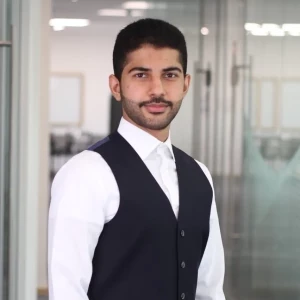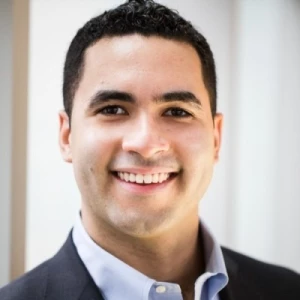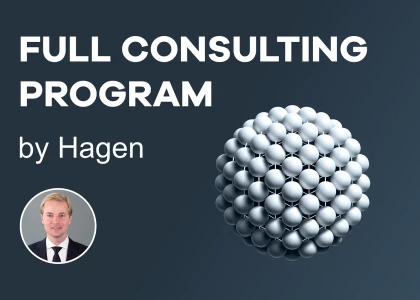Hello All,
I am interviewing for Oliver Wyman/BCG, project manager-level- ME offices. I want to understand how the case interviews and generally the overall fit/personal parts are different.
For context, the last time I was in the process was 5 years ago, when I applied for BA positions! Last year, I took a break to care for a sick parent. So now I feel a bit overwhelmed, despite having been in the industry.
any insights, materials or case books are much appreciated.
How are Senior Associate Interviews different from Junior Level Interviews


Hi there,
First of all, congratulations on the progress in the application process with BCG and Oliver Wyman thus far!
I would be happy to share my thoughts on your question:
- First of all, the case studies should be fairly comparable, although some industry and/or methodological knowledge may be expected.
- Moreover, the personal fit section may focus more on leadership, impact and client management.
- Lastly, you should expect that there may be more senior interviewers than last time, although this has no impact per se.
You can find more on this topic here: How to succeed in the final interview round.
If you would like a more detailed discussion on how to best prepare for your upcoming BCG and/or Oliver Wyman interviews, please don't hesitate to contact me directly.
Best,
Hagen

Hi Nadia,
having gone through the experienced hire process myself and having worked with colleagues at BCG who were later hires, I can say that (at least for BCG) the process is fairly similar. You still have interviews with a personal fit and a case part.
In my case the biggest difference was the seniority and the role of the interviewers. I did not have any interviewers below Principal (usually you would have almost exclusively Consultants and Project Leaders). Also the interviewers were all closely affiliated to the functional area I applied for (Corporate Finance) and we touched on certain function specific topics.
Case part: When interviewing for a manager / project leader position, I would expect that they throw in some additional question along the lines of "how would you slide this project into workstreams", "what would you consider when staffing for this project". However, still expect to be asked to solve a "normal" consulting case.
Personal fit part: Here I would expect the biggest difference to the standard graduate that applies. Be prepared to go very deep on your previous experience and especially your motivation to join Consulting now. This will be a key question for them to understand as they want to be extra sure that you know what you are signing up and are fully committed.
Happy to chat if you have any further questions.
Best,
Sebastian

Hi Nadia,
From my experience as interviewer, there wouldn't be too much difference in assessing your structure, how you problem solve etc. The fundamentals would be fairly similar.
That said, there could be difference in expectation of your business sense and maturity you present during the interview, due to the change of seniority and your additional experience over the past few years. They would expect the candidate to show the capability that he/she can lead a (small) workstream instead of only being told what to execute.
Happy to discuss more if you need.
Best,
Emily
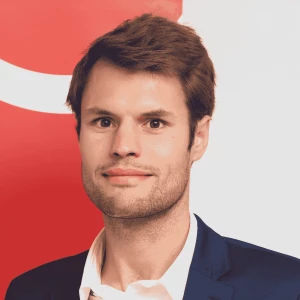
Hi Nadia,
The primary difference is that they expect you to show your gained experience. This experience includes prior industry experience, team & client management skills. The case for a SA position might be more complex and go one level deeper. The behavioral interview will focus more on specific questions related to leadership and team management.
I have some real cases used during SA interviews.
Feel free to reach out if you are interested.
Mattijs

Hi there,
You can review the process this way:
- Process: Two rounds, two interviews per round
- Interview Structure: Fit questions will focus more on your industry expertise. BCG focuses on industry expertise from the Project leader onward for lateral hires.
- Interviewers: At BCG, you'll only find partners or MDMDPsManaging Director and Partners) At least two of them will be MDPs who sponsor you, which means they will be industry leads.
- Cases: These are very similar to the other levels. The cases do not depend on the industry. ; each partner/MDP has its own case
Best,
Carlos

Hey there 🙂, first off, it's great that you're re-entering the process, and it's completely normal to feel a bit overwhelmed after a break.
For Senior Associate/Project Manager-level interviews, the biggest differences from junior-level interviews are:
- Case Interviews: While the core structure remains the same, expect more emphasis on leadership, structuring complex problems, and top-down communication. Instead of just solving the case, you'll be expected to guide the conversation, demonstrate high-level thinking, and make strategic recommendations, almost as if you were already leading a team.
- Fit/Personal Interviews: At this level, firms are looking for leadership, impact, and the ability to manage clients and teams. Expect deeper questions on how you handled conflicts, led initiatives, influenced stakeholders, or drove measurable results. Your one-year break is totally fine—just frame it as a period of personal responsibility, and highlight how you’re now fully prepared to take on leadership roles.
- Business Judgment & Industry Expertise: More weight is given to your market insights and ability to link recommendations to industry trends—so brush up on relevant sectors in the Middle East to show you understand the regional business landscape.
For prep materials, I’d recommend Consulting Case Club Books / PrepLounge Cases for structuring, and more advanced MBB/OW casebooks (I can help find some resources if needed). Also, practicing with experienced case partners who push you on leadership and decision-making will be super helpful.
You’ve got this! Feel free to reach out if you need more tailored guidance. Best, Alessa 😇

I’ve helped several people join OW in different Middle East offices across various tenures, and the process was the same for all of them—even with some candidates receiving identical cases.
Best,
Alberto
—
Explore my latest case inspired by a real MBB interview: Sierra Sprints - New Product Launch

Hi there,
The case interviews and fit/personal questions remain largely the same. However, the expectations shift in a few key ways:
- Case Interviews: While the structure and problem-solving approach are unchanged, there is greater emphasis or - let's say - expectation on business judgment, maturity, and strategic thinking rather than just analytical ability. You'll be expected to demonstrate a higher-level perspective, connecting insights to broader business implications.
- Fit/Personal Interviews: The focus is more on leadership, impact, and responsibility. Expect deeper questions about leading teams, managing stakeholders, driving business results, and influencing senior clients. Your ability to own and execute initiatives will be scrutinized more than your individual problem-solving skills.
That said, your preparation approach should remain the same - practicing structured problem-solving, refining your business judgment, and preparing strong leadership/impact stories for the fit interview. As for the prep, I can recommend the book I wrote about case interviews (you can find it on Amazon).
Cheers,
Florian

As an interviewer, I gave the same case to different candidates, whether they were interns, Senior Associates, or Project Leaders/Managers.
The difference is in terms of the expectation of the quality of the answer/abilities, and specifically for PL level, potentially some practical questions to test your ability to lead a project.
Hope this helps - all the best!
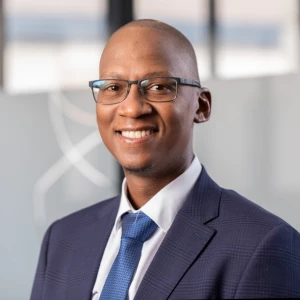
Hey there,
From my experience, the interview processes is similar, and the cases are the same across the levels.
However, for Oliver Wyman, there is a higher expectation on levels of answering and depth of insights the more senior the positions are.
All the best

The process is exactly the same, and you should prepare the same way.
What is different is the expectation on your performance and the business acumen you should be able to show.
